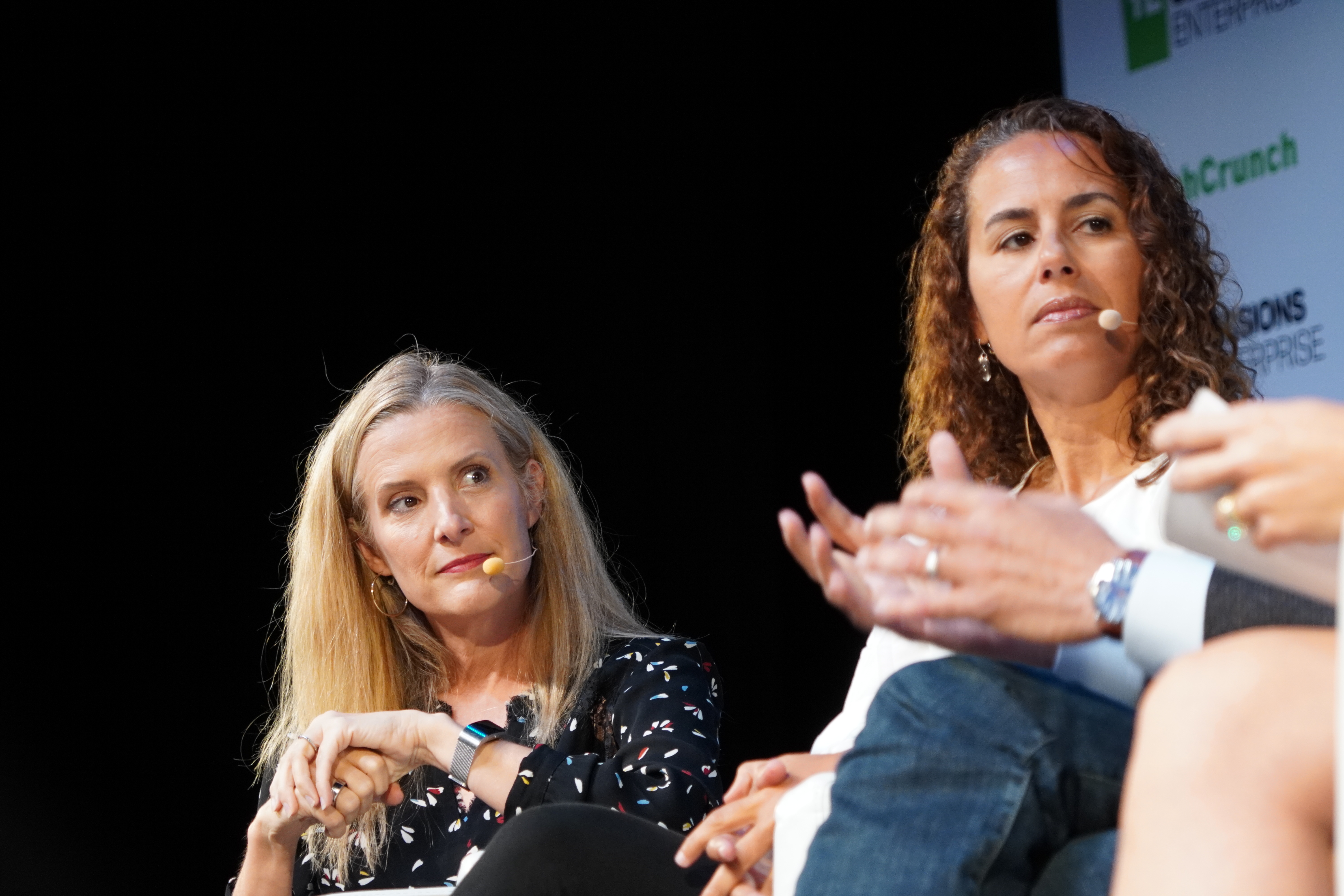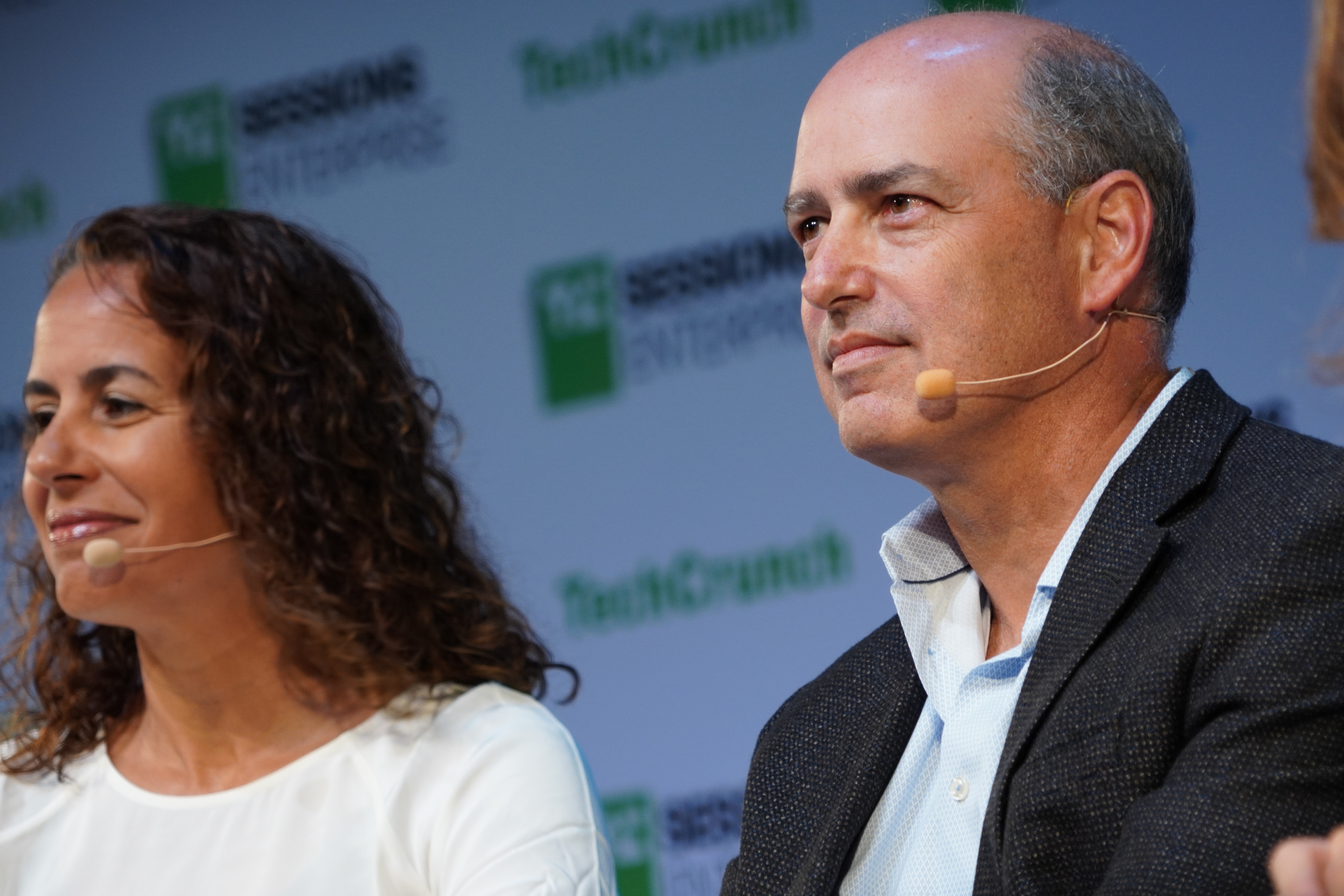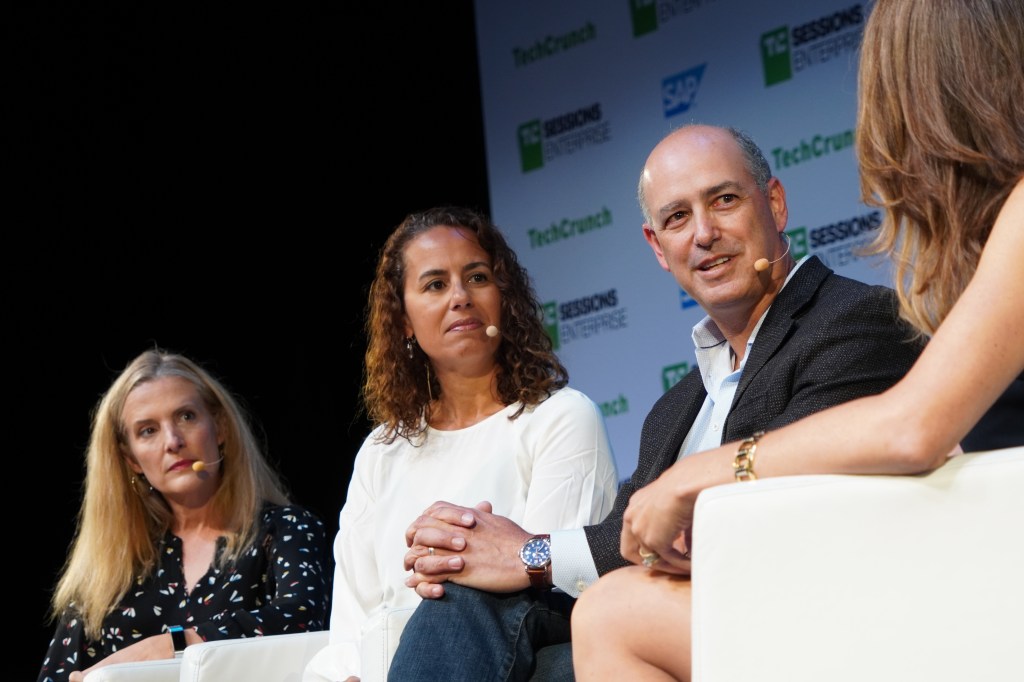Yesterday at TechCrunch’s Enterprise event in San Francisco, we sat down with three venture capitalists who spend a lot of their time thinking about enterprise startups. We wanted to ask what trends they are seeing, what concerns they might have about the state of the market and, of course, how startups might persuade them to write out a check.
We covered a lot of ground with the investors — Jason Green of Emergence Capital, Rebecca Lynn of Canvas Ventures and Maha Ibrahim of Canaan Partners — who told us, among other things, that startups shouldn’t expect a big M&A event right now, that there’s no first-mover advantage in the enterprise realm and why grit may be the quality that ends up keeping a startup afloat.
On the growth of enterprise startups:
Jason Green: When we started Emergence 15 years ago, we saw maybe a few hundred startups a year, and we funded about five or six. Today, we see over 1,000 a year; we probably do deep diligence on 25.
On what VCs are looking for in a team exactly, whether it be certifications or industry expertise:
Rebecca Lynn: It’s [like asking], what do you look for in a husband, right? You are working for this person, with this person, for 10 years, oftentimes through good times and bad. So you’re looking for a team that you believe can grow and evolve into a really big company. And then you’re looking for some unique insight that that team has. Maybe they worked somewhere they had a problem they were dealing with and found a great way to solve it. Especially with enterprise, that’s critical to understand the market dynamics and the market forces.
[Last] I don’t know how to call it anything else but grit… Very few companies [are moving] up and to the right their entire lives. And it’s those times that the things don’t go right, that you have to pick yourself up and keep going and keep fighting. And that’s what we look for.
On whether the VCs shop based on founders or to capture certain verticals, whether in fintech, cybersecurity, real estate or another industry:
Maha Ibrahim: It’s a mix of both. Decades ago, when we started enterprise investing, we were looking at more horizontal apps; it could be CRM, it could be marketing, automation, etc. And over the last, I’d say 10 years or so, we’ve been really focused on franchise areas within enterprise. And that could be fintech; it could be insurance tech… it could be real estate tech. And it’s morphing more and more from traditional infrastructure software and again… to things that are much more verticalized and specialized.
Green: The horizontal apps we’ve seen a lot, but they’re taking increasingly smaller slices of the problem and trying to pitch AI as basically a next-generation solution for that. And to be honest, it feels more like a feature than a reason to start a company… I think it’s really tough to kind of pick off these little slices and build a significant company.

On the metrics that matter most, and how they change over subsequent funding rounds:
Lynn: In enterprise, probably the most important metric is how much will your customer pay for this [product].
We all hope for lightning in a bottle, where you build it, and it’s self-serving, you put it on your website, and everyone comes, and you can sell it for $3,000, annually. Those things don’t exist very often, though, so what you look for are metrics that make sense for your business model. So if you have a fully staffed enterprise sales force that you need to really execute against your plan, you need [an annual contract value] that’s between $50,000 and $100,000 to really actually support that, and you need to be able to believe you can get there.
In addition, we look heavily especially later stage at a upsells. Are you upselling? Are you cross-selling? Do you have a negative net churn? We really pay attention to that.
Ibrahim: I feel like people are focusing too much on metrics and not as much to [the total addressable market]. We make money [when a startup strikes on a] huge, huge market.
But there’s [also] so much correlation between consumer and enterprise startups in that we want customers that love the product. We want customers that come back and come back and come back to us, without us having to pay for them to come back. So the equivalent in a consumer company would be me having to spend advertising dollars to acquire that customer again, as opposed to that customer just coming back because he or she loves what I’m doing. The same goes for the enterprise.
On why certain software products that everyone hates seem to endure, and the importance of salesmanship:
Green: Nowadays, the beauty of enterprises [is that] the product can almost sell itself. Great products are emerging today that are almost just being bought off the website. Zoom is a good example of that where it just spreads virally, you can build an enterprise team on top of it.
For the enterprise, we [mostly] still find that you need to support the go-to-market capabilities and support for those large accounts [with] a lot of resources and time and effort. So even a product like Zoom… you have to have the resources to support a Walmart, you know. So I do think it’s important to have that go-to-market expertise.

On how much of annual revenue is a reasonable percentage to spend on growth:
Lynn: I think it depends on your market timing.
There are all kinds of metrics out there that you read about in terms of different rules of SaaS and everything else. But I think it depends a lot on what those metrics sort of dive into — what your churn rate is, if those customers are expanding, what their annual spend is with you or they are churning. I always like to have a very clear eye on: if you couldn’t continue to fund that growth, how fast could you get profitable and support yourself. There’s a balance that companies should walk that kind of keep an eye on that metric and what would be the path to profitability if we needed to hit it.
Green: Growth trumps profitability in any market today. You have to grow.
Lynn: And you have to grow significantly. Twenty percent growth is not enough — you need to see 40% plus. That’s a requirement in this market today.
Ibrahim: At that early stage where we’re investing, companies need to be growing 50%, 60%, 70%. When they get bigger, their growth rates slow, of course. But once growth is abandoned, no one wants to fund these companies.
On what happens when startups don’t break out, do slow down and are going to be acquired in a best-case scenario:
Ibrahim: The M&A market is really fascinating right now because there are a bunch of very, very large public companies that are acquiring not necessarily for strategic value or new product expansion, but they are acquiring because they need things to be big and accretive. It’s like Salesforce buying Tableau or Microsoft buying LinkedIn. If they’re going to acquire, they’re either going to go really big, or they’re going to have tuck-in acquisitions of let’s say, $200 million or $100 million dollars or less. And those can be fine acquisitions, by the way. But if you noticed, gone are the days of these $500 million to $2 billion M&A outcomes. It’s just not happening.
Green: You’ve gotta assume that you’re going to have to build an independent company. You want to be bought; you don’t want to be sold. It’s really tough to sell a company. And the best alternative is to have an independent path. And it is challenging, and companies start to experience slowing growth and an IPO isn’t a possibility and they’ve raised a lot of capital… like, that is a tough situation. And then it comes down to grit, it comes down, does the founder, you know, want to slug it out and build a company and do what it takes. [Box CEO] Aaron Levie, is a good example of that. Like, it took a lot of capital to get to where he is, but it’s a $700 million revenue business, it’s a great product, and a great market opportunity. But it took grit to do that.
On whether first-mover advantage means anything in the enterprise:
Lynn: I think it’s a first-mover disadvantage oftentimes. Having grown up at [working on new product development at Proctor & Gamble] P&G was like, ‘Let somebody else spend all the money on proving a market, and talking to consumers and making sure there’s a need here, and then we’ll just come in and kill them with better technology and better sales.’
Look at Zoom, for example. Google Hangouts should have owned that market. There are very few companies out there [that have succeeded in a big way] that are truly the first mover.
On how much runway companies need right now, versus 18 months ago:
Lynn: I think going into the election next year, what the markets don’t like is uncertainty. And no matter how that comes out, I think things tend to freeze up beforehand a little bit. So I think it’s wise to tell people to raise what they can now while the capital is flowing pretty freely.
Green: We have a portfolio review coming up and it’s the first time in several years that we’ve said, ‘We’d like to do a stress test on the portfolio. How much cash is in the bank? What’s the runway? What are the fundraising plans? How are [our portfolio companies] managing expenses?’ I just think now’s the time to be a little bit more thoughtful about it.































Comment